System Engineering: Life Cycle Cost Analysis and Factor Evaluation
VerifiedAdded on 2023/04/23
|15
|2723
|418
Report
AI Summary
This report provides a comprehensive analysis of life cycle cost (LCC) in system engineering. It begins with a literature review, highlighting the growing importance of LCC in the software industry and various definitions of LCC. The report identifies key factors affecting LCC, such as development costs, customer acceptance, distribution methods, and customer support services, and explores their interrelationships. A high-level and detailed causal loop diagram are presented to illustrate these relationships. The report also discusses the application of LCC to a knowledge management system (KMS) and examines the consequences of buying cheap software, along with circumstances where it might be recommended. It concludes by emphasizing the importance of considering LCC for informed decision-making in system engineering.
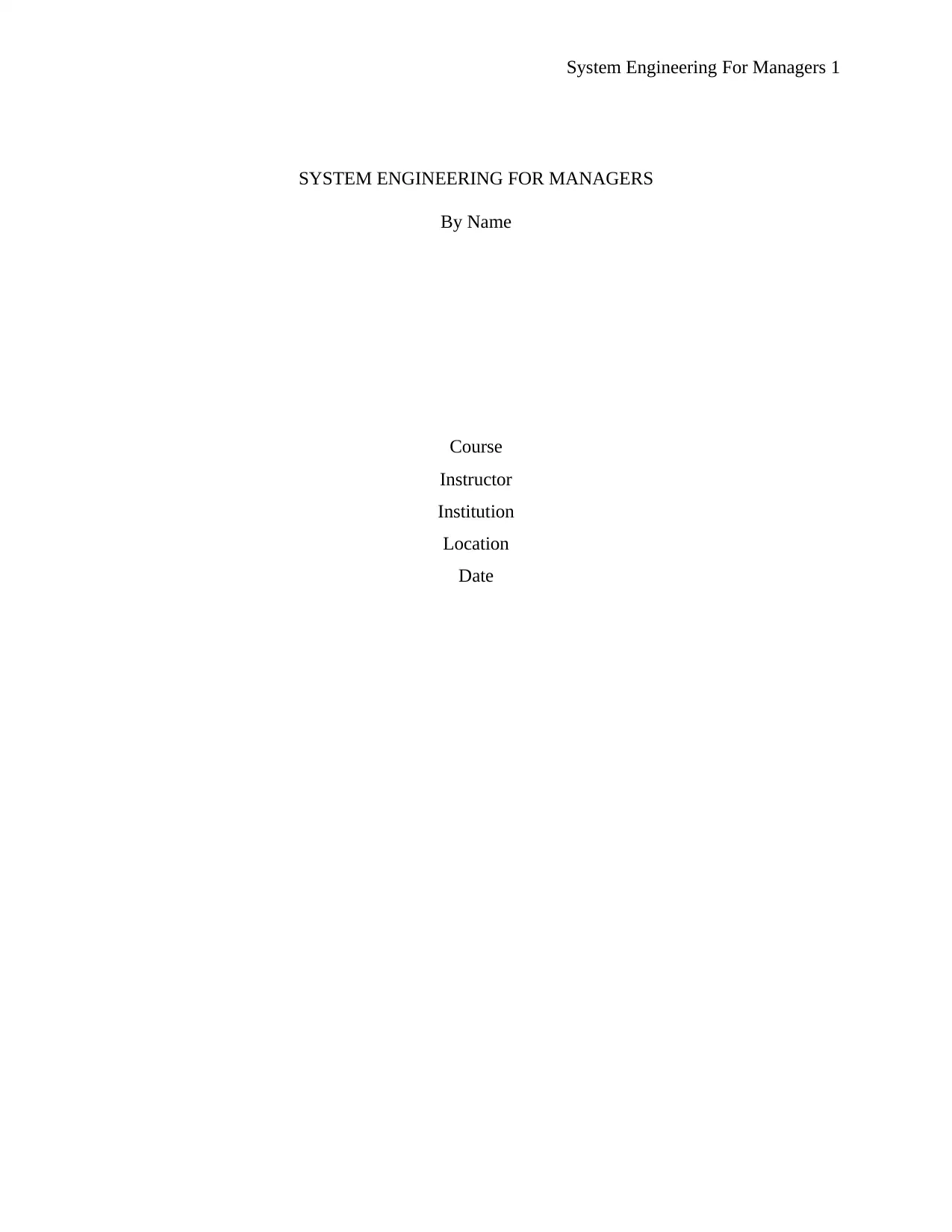
System Engineering For Managers 1
SYSTEM ENGINEERING FOR MANAGERS
By Name
Course
Instructor
Institution
Location
Date
SYSTEM ENGINEERING FOR MANAGERS
By Name
Course
Instructor
Institution
Location
Date
Paraphrase This Document
Need a fresh take? Get an instant paraphrase of this document with our AI Paraphraser
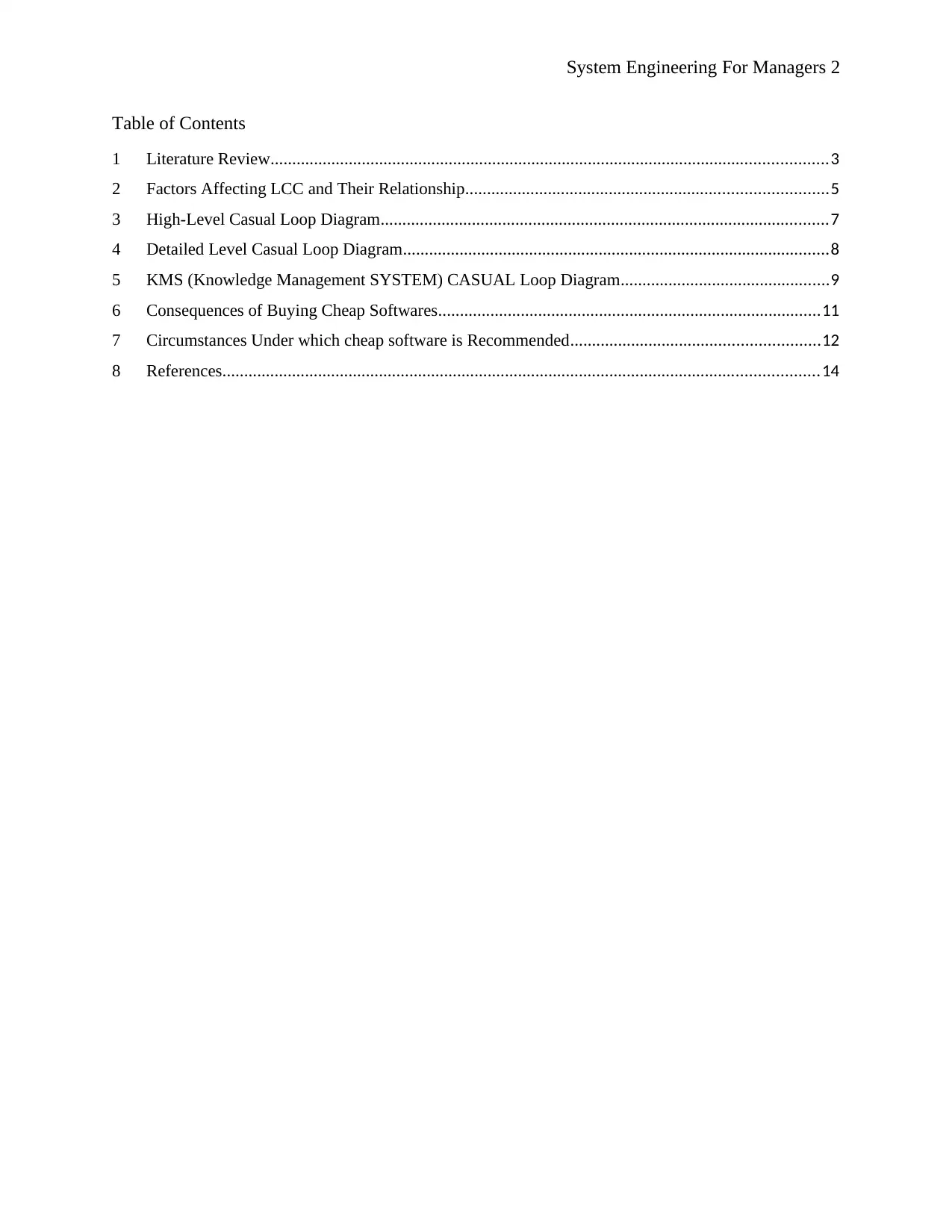
System Engineering For Managers 2
Table of Contents
1 Literature Review................................................................................................................................3
2 Factors Affecting LCC and Their Relationship...................................................................................5
3 High-Level Casual Loop Diagram.......................................................................................................7
4 Detailed Level Casual Loop Diagram..................................................................................................8
5 KMS (Knowledge Management SYSTEM) CASUAL Loop Diagram................................................9
6 Consequences of Buying Cheap Softwares........................................................................................11
7 Circumstances Under which cheap software is Recommended.........................................................12
8 References.........................................................................................................................................14
Table of Contents
1 Literature Review................................................................................................................................3
2 Factors Affecting LCC and Their Relationship...................................................................................5
3 High-Level Casual Loop Diagram.......................................................................................................7
4 Detailed Level Casual Loop Diagram..................................................................................................8
5 KMS (Knowledge Management SYSTEM) CASUAL Loop Diagram................................................9
6 Consequences of Buying Cheap Softwares........................................................................................11
7 Circumstances Under which cheap software is Recommended.........................................................12
8 References.........................................................................................................................................14
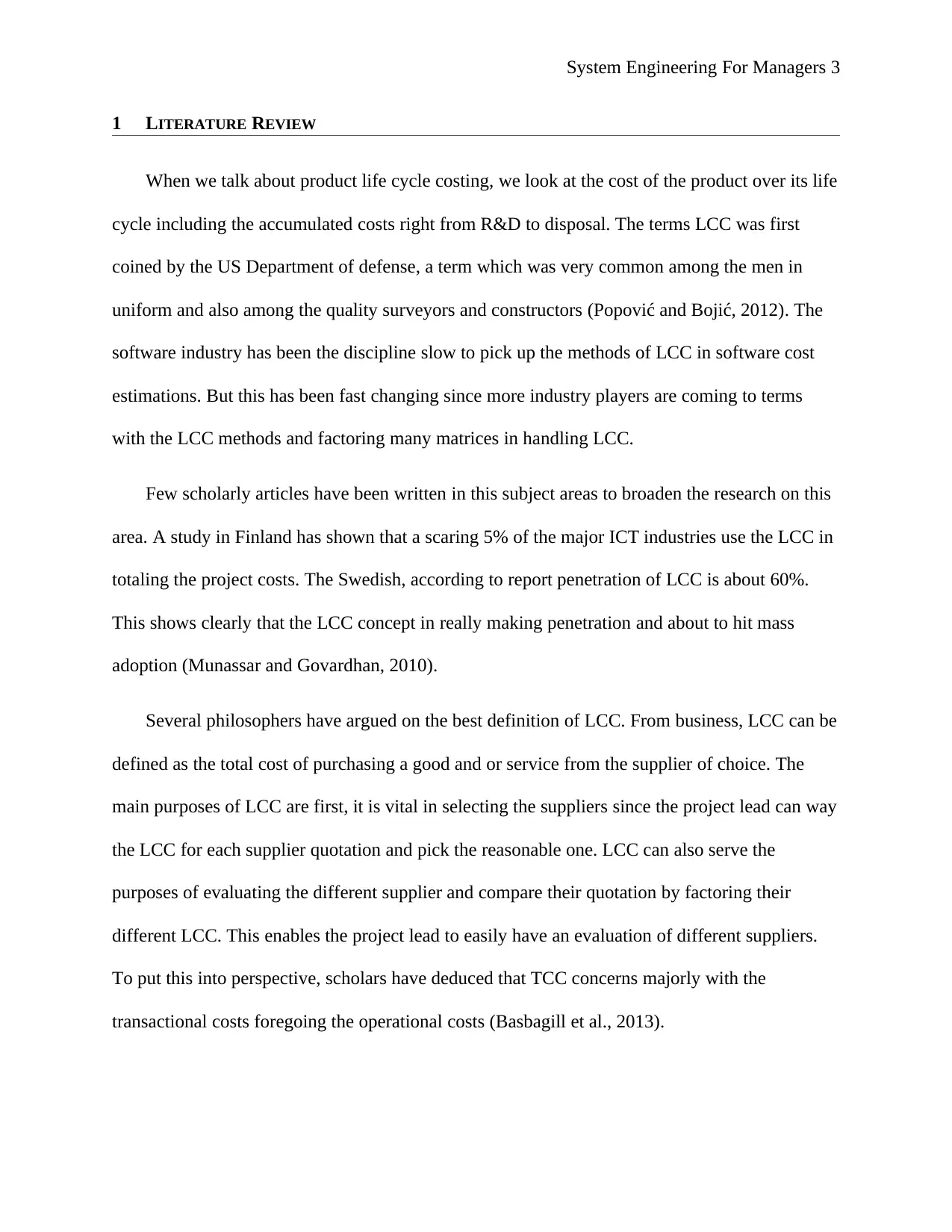
System Engineering For Managers 3
1 LITERATURE REVIEW
When we talk about product life cycle costing, we look at the cost of the product over its life
cycle including the accumulated costs right from R&D to disposal. The terms LCC was first
coined by the US Department of defense, a term which was very common among the men in
uniform and also among the quality surveyors and constructors (Popović and Bojić, 2012). The
software industry has been the discipline slow to pick up the methods of LCC in software cost
estimations. But this has been fast changing since more industry players are coming to terms
with the LCC methods and factoring many matrices in handling LCC.
Few scholarly articles have been written in this subject areas to broaden the research on this
area. A study in Finland has shown that a scaring 5% of the major ICT industries use the LCC in
totaling the project costs. The Swedish, according to report penetration of LCC is about 60%.
This shows clearly that the LCC concept in really making penetration and about to hit mass
adoption (Munassar and Govardhan, 2010).
Several philosophers have argued on the best definition of LCC. From business, LCC can be
defined as the total cost of purchasing a good and or service from the supplier of choice. The
main purposes of LCC are first, it is vital in selecting the suppliers since the project lead can way
the LCC for each supplier quotation and pick the reasonable one. LCC can also serve the
purposes of evaluating the different supplier and compare their quotation by factoring their
different LCC. This enables the project lead to easily have an evaluation of different suppliers.
To put this into perspective, scholars have deduced that TCC concerns majorly with the
transactional costs foregoing the operational costs (Basbagill et al., 2013).
1 LITERATURE REVIEW
When we talk about product life cycle costing, we look at the cost of the product over its life
cycle including the accumulated costs right from R&D to disposal. The terms LCC was first
coined by the US Department of defense, a term which was very common among the men in
uniform and also among the quality surveyors and constructors (Popović and Bojić, 2012). The
software industry has been the discipline slow to pick up the methods of LCC in software cost
estimations. But this has been fast changing since more industry players are coming to terms
with the LCC methods and factoring many matrices in handling LCC.
Few scholarly articles have been written in this subject areas to broaden the research on this
area. A study in Finland has shown that a scaring 5% of the major ICT industries use the LCC in
totaling the project costs. The Swedish, according to report penetration of LCC is about 60%.
This shows clearly that the LCC concept in really making penetration and about to hit mass
adoption (Munassar and Govardhan, 2010).
Several philosophers have argued on the best definition of LCC. From business, LCC can be
defined as the total cost of purchasing a good and or service from the supplier of choice. The
main purposes of LCC are first, it is vital in selecting the suppliers since the project lead can way
the LCC for each supplier quotation and pick the reasonable one. LCC can also serve the
purposes of evaluating the different supplier and compare their quotation by factoring their
different LCC. This enables the project lead to easily have an evaluation of different suppliers.
To put this into perspective, scholars have deduced that TCC concerns majorly with the
transactional costs foregoing the operational costs (Basbagill et al., 2013).
⊘ This is a preview!⊘
Do you want full access?
Subscribe today to unlock all pages.

Trusted by 1+ million students worldwide
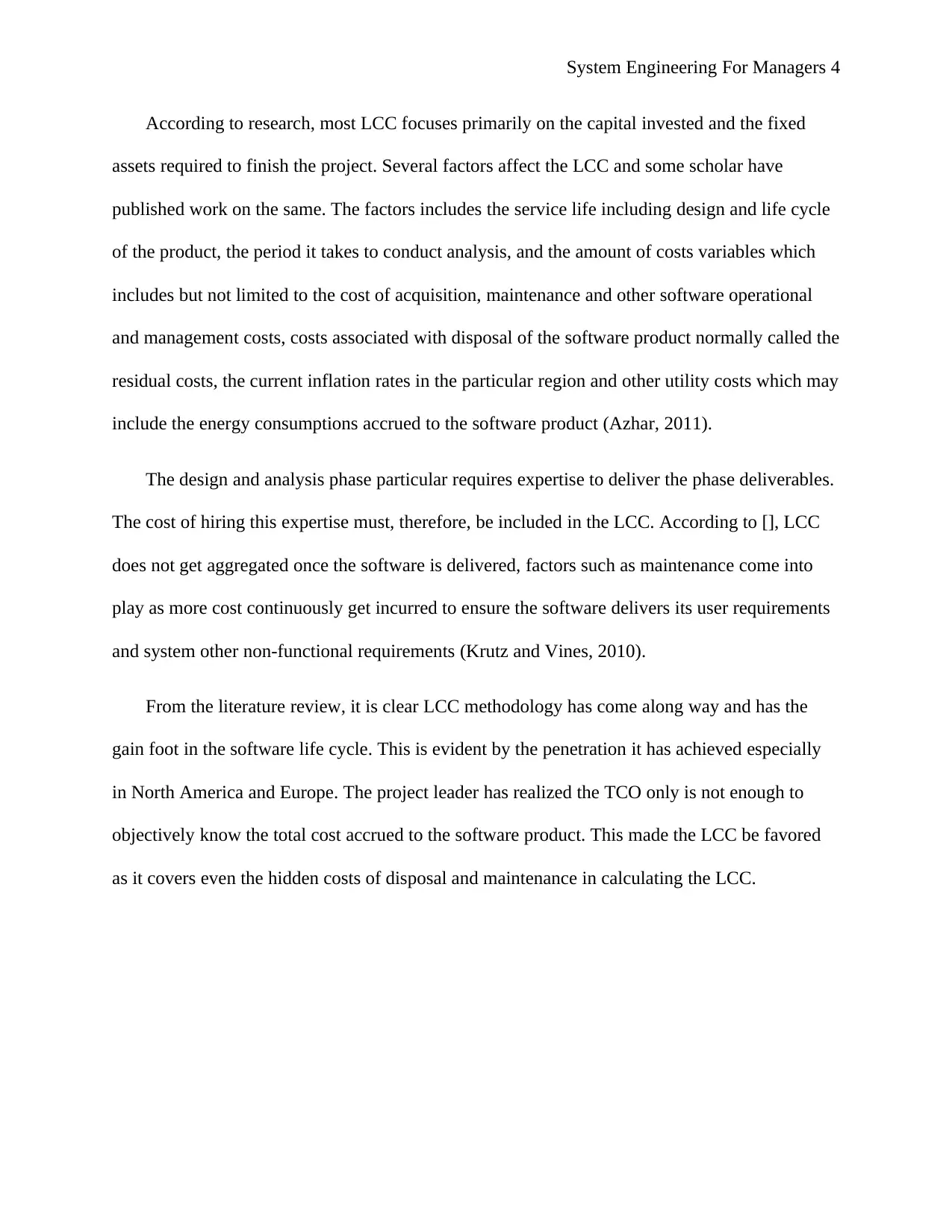
System Engineering For Managers 4
According to research, most LCC focuses primarily on the capital invested and the fixed
assets required to finish the project. Several factors affect the LCC and some scholar have
published work on the same. The factors includes the service life including design and life cycle
of the product, the period it takes to conduct analysis, and the amount of costs variables which
includes but not limited to the cost of acquisition, maintenance and other software operational
and management costs, costs associated with disposal of the software product normally called the
residual costs, the current inflation rates in the particular region and other utility costs which may
include the energy consumptions accrued to the software product (Azhar, 2011).
The design and analysis phase particular requires expertise to deliver the phase deliverables.
The cost of hiring this expertise must, therefore, be included in the LCC. According to [], LCC
does not get aggregated once the software is delivered, factors such as maintenance come into
play as more cost continuously get incurred to ensure the software delivers its user requirements
and system other non-functional requirements (Krutz and Vines, 2010).
From the literature review, it is clear LCC methodology has come along way and has the
gain foot in the software life cycle. This is evident by the penetration it has achieved especially
in North America and Europe. The project leader has realized the TCO only is not enough to
objectively know the total cost accrued to the software product. This made the LCC be favored
as it covers even the hidden costs of disposal and maintenance in calculating the LCC.
According to research, most LCC focuses primarily on the capital invested and the fixed
assets required to finish the project. Several factors affect the LCC and some scholar have
published work on the same. The factors includes the service life including design and life cycle
of the product, the period it takes to conduct analysis, and the amount of costs variables which
includes but not limited to the cost of acquisition, maintenance and other software operational
and management costs, costs associated with disposal of the software product normally called the
residual costs, the current inflation rates in the particular region and other utility costs which may
include the energy consumptions accrued to the software product (Azhar, 2011).
The design and analysis phase particular requires expertise to deliver the phase deliverables.
The cost of hiring this expertise must, therefore, be included in the LCC. According to [], LCC
does not get aggregated once the software is delivered, factors such as maintenance come into
play as more cost continuously get incurred to ensure the software delivers its user requirements
and system other non-functional requirements (Krutz and Vines, 2010).
From the literature review, it is clear LCC methodology has come along way and has the
gain foot in the software life cycle. This is evident by the penetration it has achieved especially
in North America and Europe. The project leader has realized the TCO only is not enough to
objectively know the total cost accrued to the software product. This made the LCC be favored
as it covers even the hidden costs of disposal and maintenance in calculating the LCC.
Paraphrase This Document
Need a fresh take? Get an instant paraphrase of this document with our AI Paraphraser
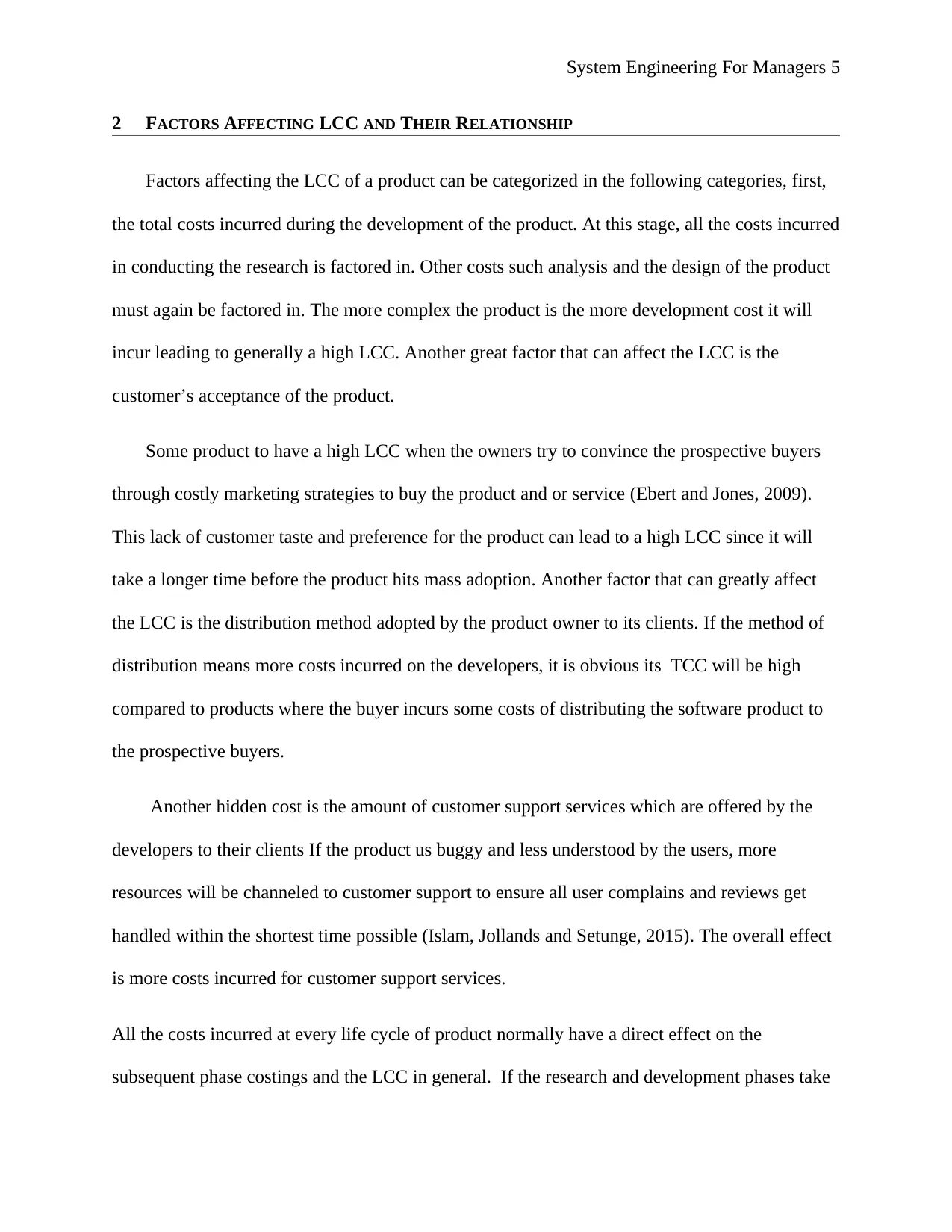
System Engineering For Managers 5
2 FACTORS AFFECTING LCC AND THEIR RELATIONSHIP
Factors affecting the LCC of a product can be categorized in the following categories, first,
the total costs incurred during the development of the product. At this stage, all the costs incurred
in conducting the research is factored in. Other costs such analysis and the design of the product
must again be factored in. The more complex the product is the more development cost it will
incur leading to generally a high LCC. Another great factor that can affect the LCC is the
customer’s acceptance of the product.
Some product to have a high LCC when the owners try to convince the prospective buyers
through costly marketing strategies to buy the product and or service (Ebert and Jones, 2009).
This lack of customer taste and preference for the product can lead to a high LCC since it will
take a longer time before the product hits mass adoption. Another factor that can greatly affect
the LCC is the distribution method adopted by the product owner to its clients. If the method of
distribution means more costs incurred on the developers, it is obvious its TCC will be high
compared to products where the buyer incurs some costs of distributing the software product to
the prospective buyers.
Another hidden cost is the amount of customer support services which are offered by the
developers to their clients If the product us buggy and less understood by the users, more
resources will be channeled to customer support to ensure all user complains and reviews get
handled within the shortest time possible (Islam, Jollands and Setunge, 2015). The overall effect
is more costs incurred for customer support services.
All the costs incurred at every life cycle of product normally have a direct effect on the
subsequent phase costings and the LCC in general. If the research and development phases take
2 FACTORS AFFECTING LCC AND THEIR RELATIONSHIP
Factors affecting the LCC of a product can be categorized in the following categories, first,
the total costs incurred during the development of the product. At this stage, all the costs incurred
in conducting the research is factored in. Other costs such analysis and the design of the product
must again be factored in. The more complex the product is the more development cost it will
incur leading to generally a high LCC. Another great factor that can affect the LCC is the
customer’s acceptance of the product.
Some product to have a high LCC when the owners try to convince the prospective buyers
through costly marketing strategies to buy the product and or service (Ebert and Jones, 2009).
This lack of customer taste and preference for the product can lead to a high LCC since it will
take a longer time before the product hits mass adoption. Another factor that can greatly affect
the LCC is the distribution method adopted by the product owner to its clients. If the method of
distribution means more costs incurred on the developers, it is obvious its TCC will be high
compared to products where the buyer incurs some costs of distributing the software product to
the prospective buyers.
Another hidden cost is the amount of customer support services which are offered by the
developers to their clients If the product us buggy and less understood by the users, more
resources will be channeled to customer support to ensure all user complains and reviews get
handled within the shortest time possible (Islam, Jollands and Setunge, 2015). The overall effect
is more costs incurred for customer support services.
All the costs incurred at every life cycle of product normally have a direct effect on the
subsequent phase costings and the LCC in general. If the research and development phases take
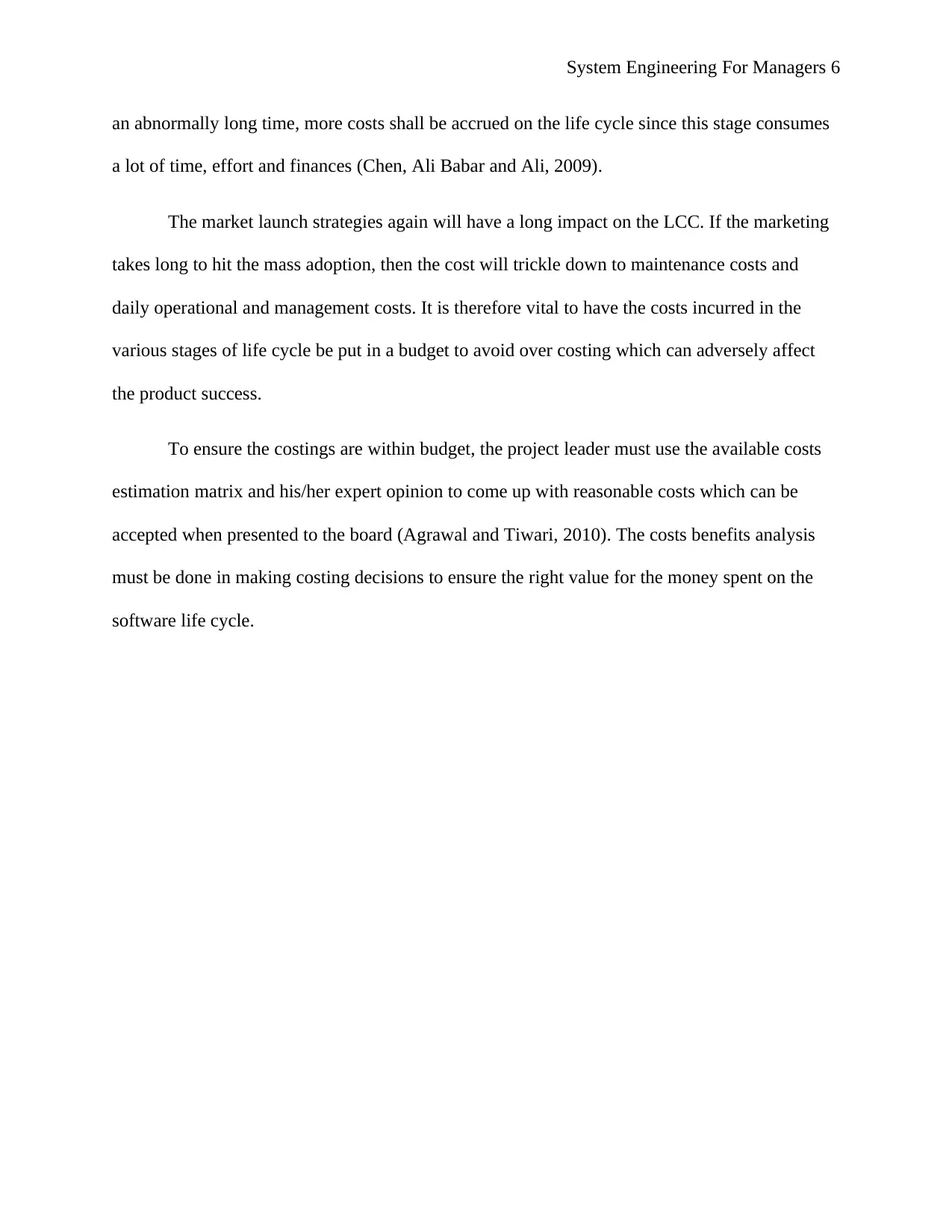
System Engineering For Managers 6
an abnormally long time, more costs shall be accrued on the life cycle since this stage consumes
a lot of time, effort and finances (Chen, Ali Babar and Ali, 2009).
The market launch strategies again will have a long impact on the LCC. If the marketing
takes long to hit the mass adoption, then the cost will trickle down to maintenance costs and
daily operational and management costs. It is therefore vital to have the costs incurred in the
various stages of life cycle be put in a budget to avoid over costing which can adversely affect
the product success.
To ensure the costings are within budget, the project leader must use the available costs
estimation matrix and his/her expert opinion to come up with reasonable costs which can be
accepted when presented to the board (Agrawal and Tiwari, 2010). The costs benefits analysis
must be done in making costing decisions to ensure the right value for the money spent on the
software life cycle.
an abnormally long time, more costs shall be accrued on the life cycle since this stage consumes
a lot of time, effort and finances (Chen, Ali Babar and Ali, 2009).
The market launch strategies again will have a long impact on the LCC. If the marketing
takes long to hit the mass adoption, then the cost will trickle down to maintenance costs and
daily operational and management costs. It is therefore vital to have the costs incurred in the
various stages of life cycle be put in a budget to avoid over costing which can adversely affect
the product success.
To ensure the costings are within budget, the project leader must use the available costs
estimation matrix and his/her expert opinion to come up with reasonable costs which can be
accepted when presented to the board (Agrawal and Tiwari, 2010). The costs benefits analysis
must be done in making costing decisions to ensure the right value for the money spent on the
software life cycle.
⊘ This is a preview!⊘
Do you want full access?
Subscribe today to unlock all pages.

Trusted by 1+ million students worldwide
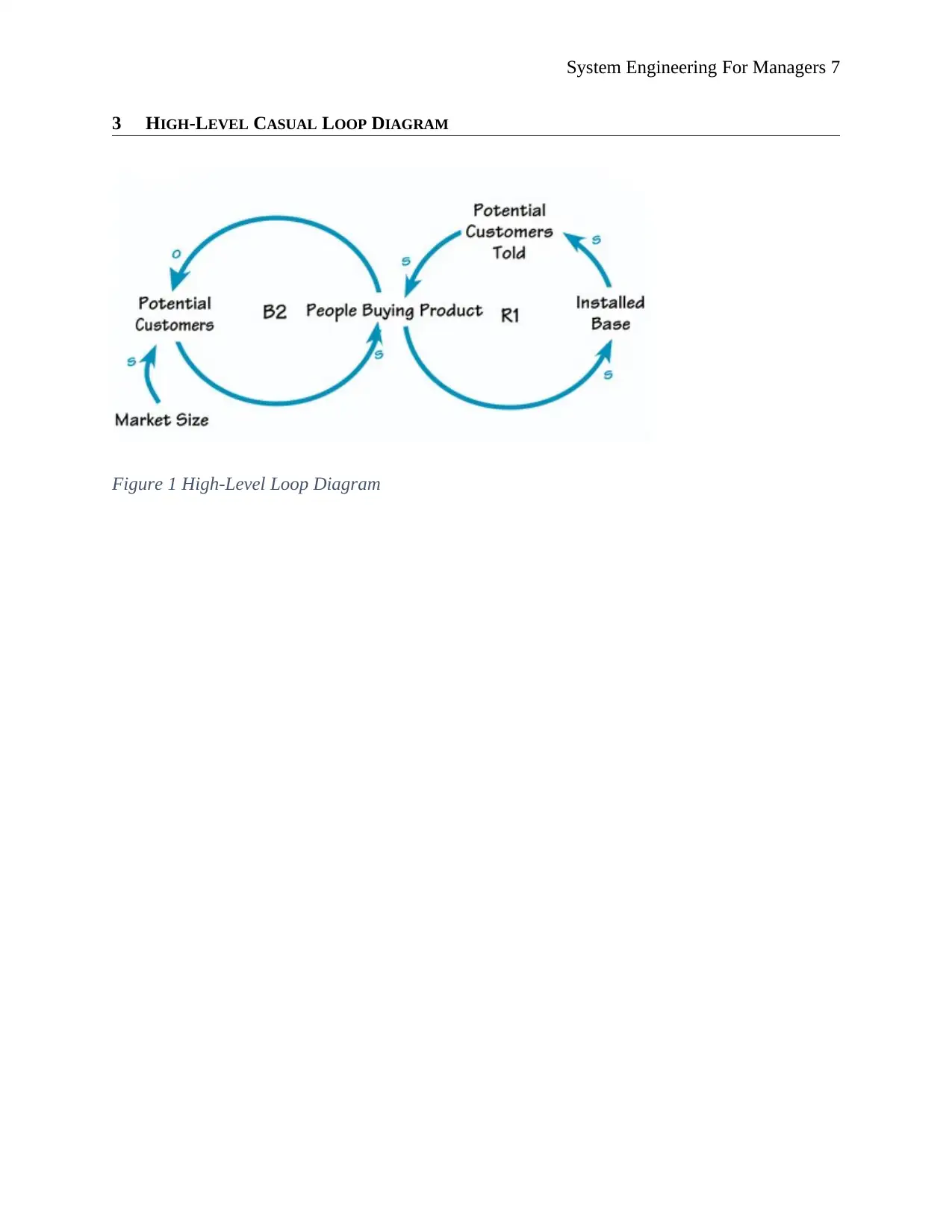
System Engineering For Managers 7
3 HIGH-LEVEL CASUAL LOOP DIAGRAM
Figure 1 High-Level Loop Diagram
3 HIGH-LEVEL CASUAL LOOP DIAGRAM
Figure 1 High-Level Loop Diagram
Paraphrase This Document
Need a fresh take? Get an instant paraphrase of this document with our AI Paraphraser
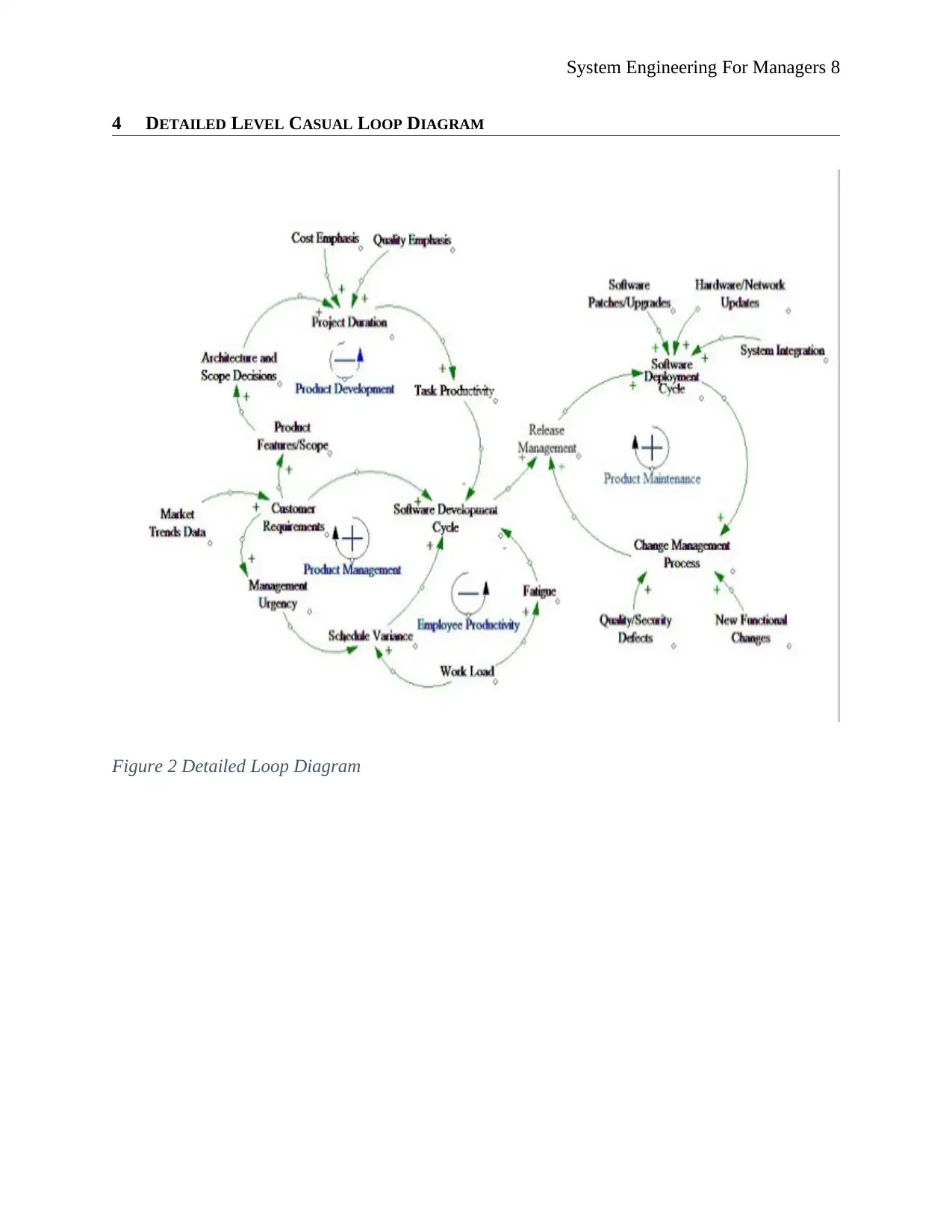
System Engineering For Managers 8
4 DETAILED LEVEL CASUAL LOOP DIAGRAM
Figure 2 Detailed Loop Diagram
4 DETAILED LEVEL CASUAL LOOP DIAGRAM
Figure 2 Detailed Loop Diagram
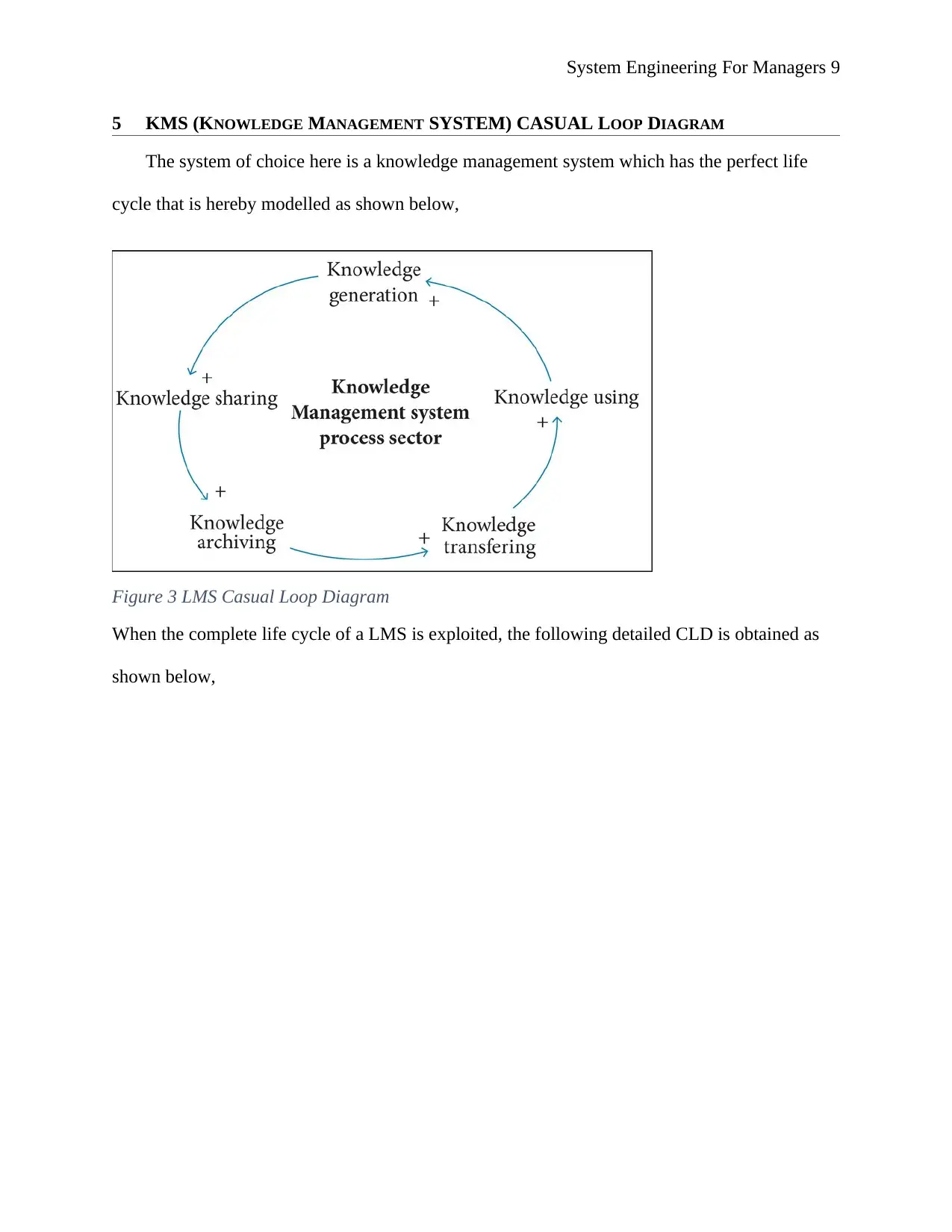
System Engineering For Managers 9
5 KMS (KNOWLEDGE MANAGEMENT SYSTEM) CASUAL LOOP DIAGRAM
The system of choice here is a knowledge management system which has the perfect life
cycle that is hereby modelled as shown below,
Figure 3 LMS Casual Loop Diagram
When the complete life cycle of a LMS is exploited, the following detailed CLD is obtained as
shown below,
5 KMS (KNOWLEDGE MANAGEMENT SYSTEM) CASUAL LOOP DIAGRAM
The system of choice here is a knowledge management system which has the perfect life
cycle that is hereby modelled as shown below,
Figure 3 LMS Casual Loop Diagram
When the complete life cycle of a LMS is exploited, the following detailed CLD is obtained as
shown below,
⊘ This is a preview!⊘
Do you want full access?
Subscribe today to unlock all pages.

Trusted by 1+ million students worldwide
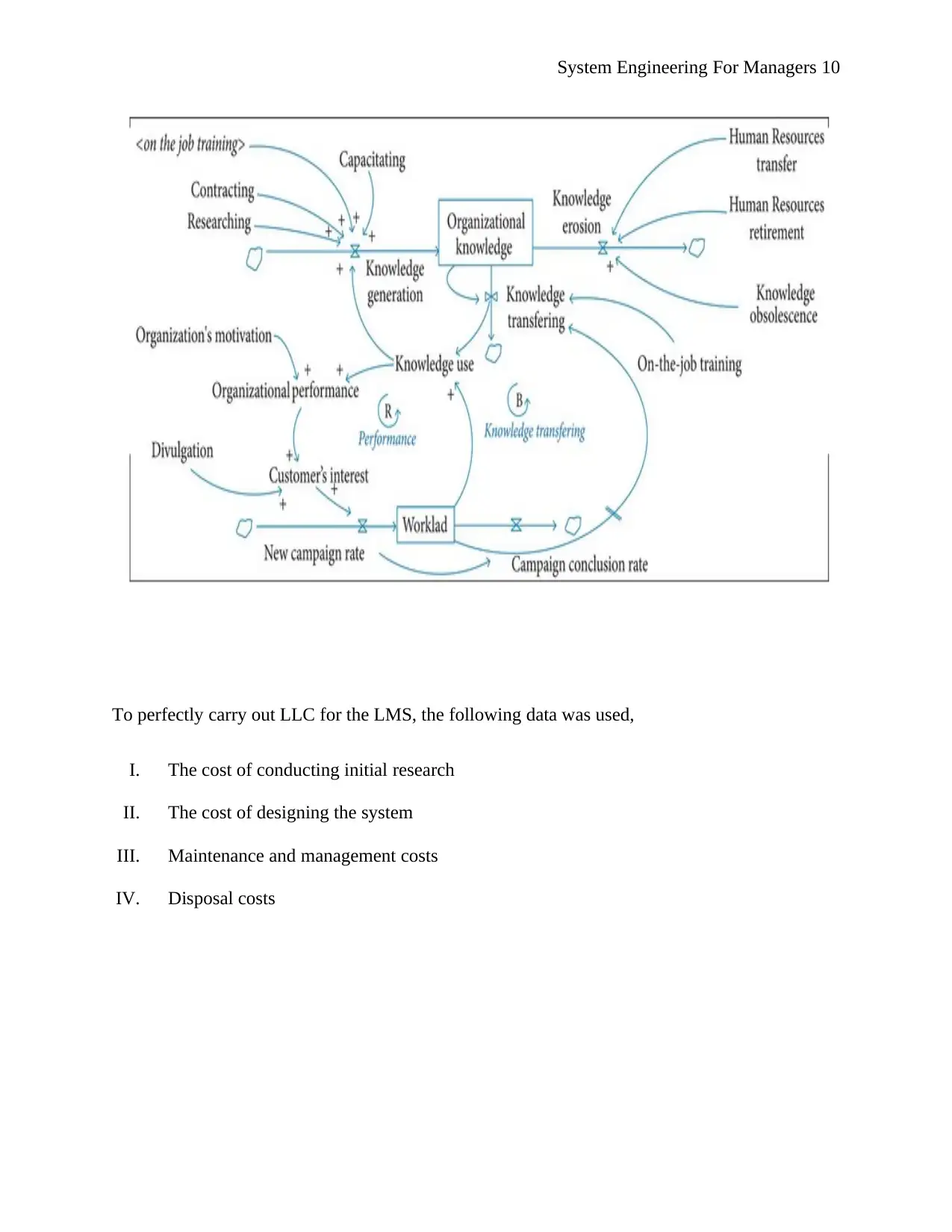
System Engineering For Managers 10
To perfectly carry out LLC for the LMS, the following data was used,
I. The cost of conducting initial research
II. The cost of designing the system
III. Maintenance and management costs
IV. Disposal costs
To perfectly carry out LLC for the LMS, the following data was used,
I. The cost of conducting initial research
II. The cost of designing the system
III. Maintenance and management costs
IV. Disposal costs
Paraphrase This Document
Need a fresh take? Get an instant paraphrase of this document with our AI Paraphraser
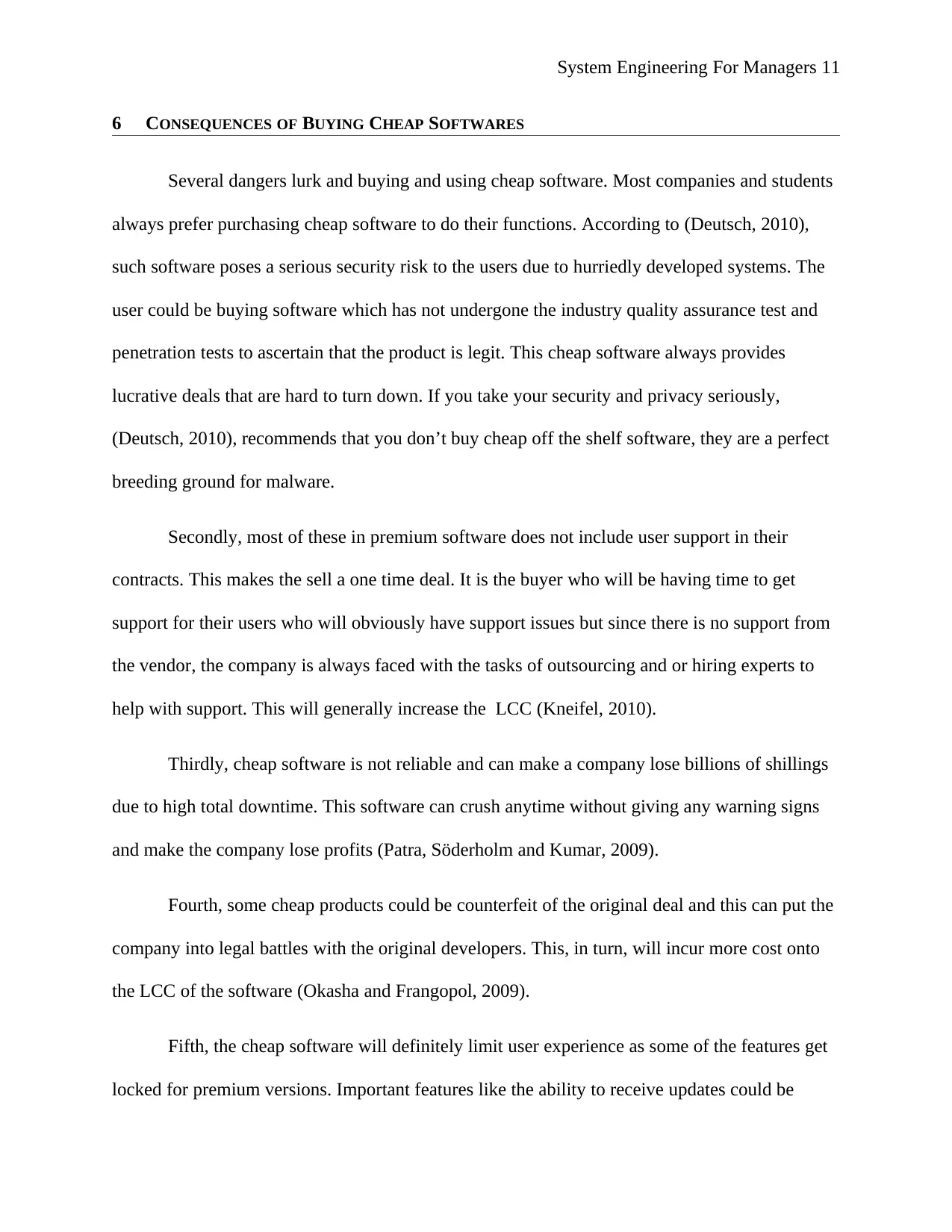
System Engineering For Managers 11
6 CONSEQUENCES OF BUYING CHEAP SOFTWARES
Several dangers lurk and buying and using cheap software. Most companies and students
always prefer purchasing cheap software to do their functions. According to (Deutsch, 2010),
such software poses a serious security risk to the users due to hurriedly developed systems. The
user could be buying software which has not undergone the industry quality assurance test and
penetration tests to ascertain that the product is legit. This cheap software always provides
lucrative deals that are hard to turn down. If you take your security and privacy seriously,
(Deutsch, 2010), recommends that you don’t buy cheap off the shelf software, they are a perfect
breeding ground for malware.
Secondly, most of these in premium software does not include user support in their
contracts. This makes the sell a one time deal. It is the buyer who will be having time to get
support for their users who will obviously have support issues but since there is no support from
the vendor, the company is always faced with the tasks of outsourcing and or hiring experts to
help with support. This will generally increase the LCC (Kneifel, 2010).
Thirdly, cheap software is not reliable and can make a company lose billions of shillings
due to high total downtime. This software can crush anytime without giving any warning signs
and make the company lose profits (Patra, Söderholm and Kumar, 2009).
Fourth, some cheap products could be counterfeit of the original deal and this can put the
company into legal battles with the original developers. This, in turn, will incur more cost onto
the LCC of the software (Okasha and Frangopol, 2009).
Fifth, the cheap software will definitely limit user experience as some of the features get
locked for premium versions. Important features like the ability to receive updates could be
6 CONSEQUENCES OF BUYING CHEAP SOFTWARES
Several dangers lurk and buying and using cheap software. Most companies and students
always prefer purchasing cheap software to do their functions. According to (Deutsch, 2010),
such software poses a serious security risk to the users due to hurriedly developed systems. The
user could be buying software which has not undergone the industry quality assurance test and
penetration tests to ascertain that the product is legit. This cheap software always provides
lucrative deals that are hard to turn down. If you take your security and privacy seriously,
(Deutsch, 2010), recommends that you don’t buy cheap off the shelf software, they are a perfect
breeding ground for malware.
Secondly, most of these in premium software does not include user support in their
contracts. This makes the sell a one time deal. It is the buyer who will be having time to get
support for their users who will obviously have support issues but since there is no support from
the vendor, the company is always faced with the tasks of outsourcing and or hiring experts to
help with support. This will generally increase the LCC (Kneifel, 2010).
Thirdly, cheap software is not reliable and can make a company lose billions of shillings
due to high total downtime. This software can crush anytime without giving any warning signs
and make the company lose profits (Patra, Söderholm and Kumar, 2009).
Fourth, some cheap products could be counterfeit of the original deal and this can put the
company into legal battles with the original developers. This, in turn, will incur more cost onto
the LCC of the software (Okasha and Frangopol, 2009).
Fifth, the cheap software will definitely limit user experience as some of the features get
locked for premium versions. Important features like the ability to receive updates could be
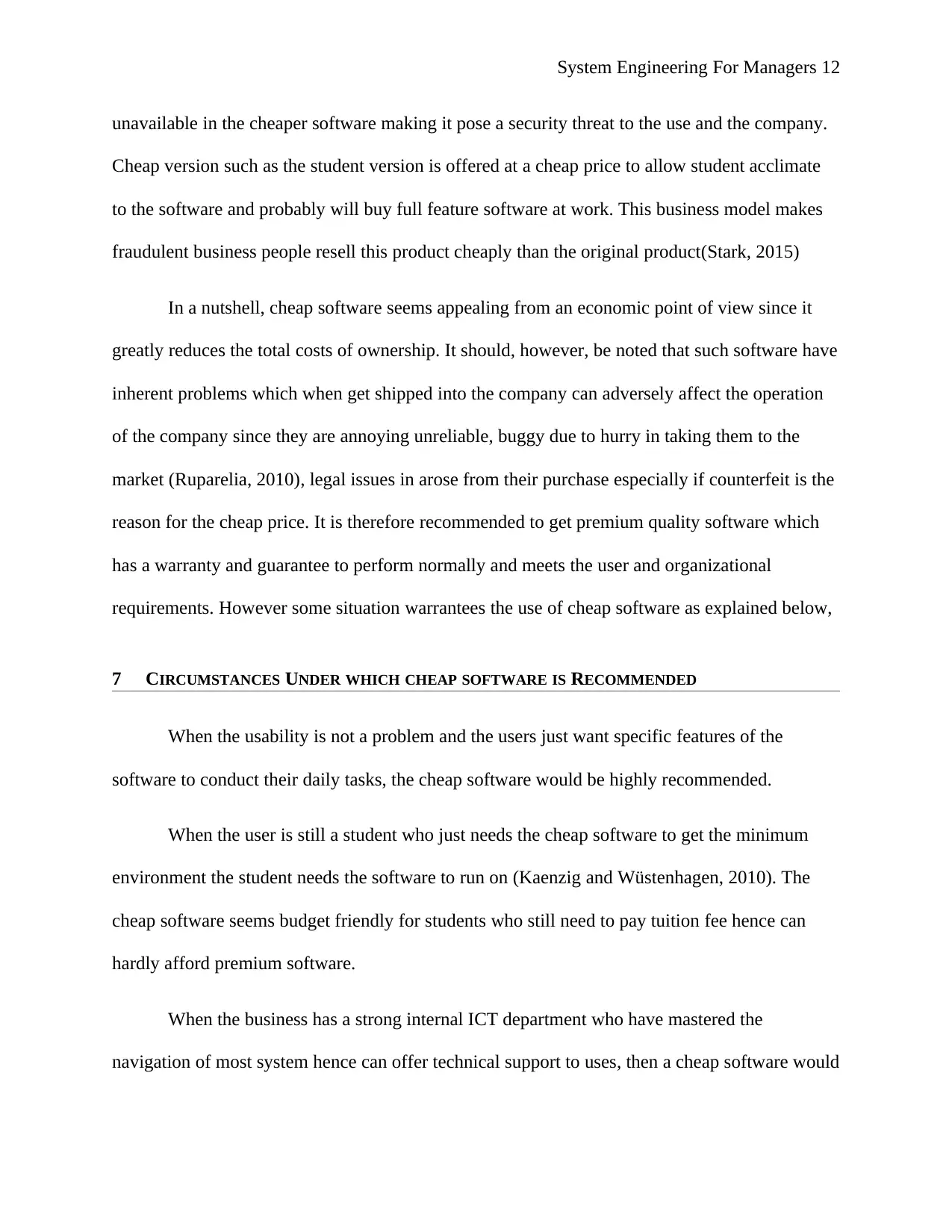
System Engineering For Managers 12
unavailable in the cheaper software making it pose a security threat to the use and the company.
Cheap version such as the student version is offered at a cheap price to allow student acclimate
to the software and probably will buy full feature software at work. This business model makes
fraudulent business people resell this product cheaply than the original product(Stark, 2015)
In a nutshell, cheap software seems appealing from an economic point of view since it
greatly reduces the total costs of ownership. It should, however, be noted that such software have
inherent problems which when get shipped into the company can adversely affect the operation
of the company since they are annoying unreliable, buggy due to hurry in taking them to the
market (Ruparelia, 2010), legal issues in arose from their purchase especially if counterfeit is the
reason for the cheap price. It is therefore recommended to get premium quality software which
has a warranty and guarantee to perform normally and meets the user and organizational
requirements. However some situation warrantees the use of cheap software as explained below,
7 CIRCUMSTANCES UNDER WHICH CHEAP SOFTWARE IS RECOMMENDED
When the usability is not a problem and the users just want specific features of the
software to conduct their daily tasks, the cheap software would be highly recommended.
When the user is still a student who just needs the cheap software to get the minimum
environment the student needs the software to run on (Kaenzig and Wüstenhagen, 2010). The
cheap software seems budget friendly for students who still need to pay tuition fee hence can
hardly afford premium software.
When the business has a strong internal ICT department who have mastered the
navigation of most system hence can offer technical support to uses, then a cheap software would
unavailable in the cheaper software making it pose a security threat to the use and the company.
Cheap version such as the student version is offered at a cheap price to allow student acclimate
to the software and probably will buy full feature software at work. This business model makes
fraudulent business people resell this product cheaply than the original product(Stark, 2015)
In a nutshell, cheap software seems appealing from an economic point of view since it
greatly reduces the total costs of ownership. It should, however, be noted that such software have
inherent problems which when get shipped into the company can adversely affect the operation
of the company since they are annoying unreliable, buggy due to hurry in taking them to the
market (Ruparelia, 2010), legal issues in arose from their purchase especially if counterfeit is the
reason for the cheap price. It is therefore recommended to get premium quality software which
has a warranty and guarantee to perform normally and meets the user and organizational
requirements. However some situation warrantees the use of cheap software as explained below,
7 CIRCUMSTANCES UNDER WHICH CHEAP SOFTWARE IS RECOMMENDED
When the usability is not a problem and the users just want specific features of the
software to conduct their daily tasks, the cheap software would be highly recommended.
When the user is still a student who just needs the cheap software to get the minimum
environment the student needs the software to run on (Kaenzig and Wüstenhagen, 2010). The
cheap software seems budget friendly for students who still need to pay tuition fee hence can
hardly afford premium software.
When the business has a strong internal ICT department who have mastered the
navigation of most system hence can offer technical support to uses, then a cheap software would
⊘ This is a preview!⊘
Do you want full access?
Subscribe today to unlock all pages.

Trusted by 1+ million students worldwide
1 out of 15
Related Documents
Your All-in-One AI-Powered Toolkit for Academic Success.
+13062052269
info@desklib.com
Available 24*7 on WhatsApp / Email
![[object Object]](/_next/static/media/star-bottom.7253800d.svg)
Unlock your academic potential
Copyright © 2020–2026 A2Z Services. All Rights Reserved. Developed and managed by ZUCOL.




